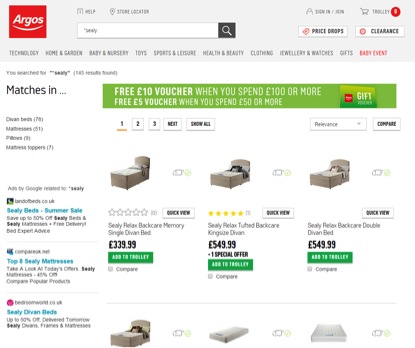Are Retailers Addicted to AdSense Revenue?
by on 24th Sep 2015 in News

Many of the UK’s leading retailers are knowingly cannibalising their revenue potential because they are addicted to the ‘safe’ revenue from AdSense.
Online retailers make money by selling products to online consumers. However, many retailers have, perhaps unwittingly, diversified from their core business to become miniature publishers, selling advertising space to other companies. The screenshot below is from Argos.co.uk after searching for 'sealy beds'.
The majority of the page is taken up with listings of products that match the search criteria, however, on the left hand side of the page, there are Google AdSense adverts.
Having decided to visit Argos.co.uk, searched for a specific bed manufacturer, the user is presented with two options. Click on the product listings from the retailer and stay on Argos.co.uk and go through to a dedicated product page, OR: click on one of the ads on the left and leave the Argos site.
This makes no sense!
The reason retailers do this is simple: money. Google gives the retailer a (minimal) cut of the revenue it makes from placing adverts on their site and the site owners have become reliant on this revenue.
In this instance, Argos.co.uk has achieved top-funnel awareness and a consumer has chosen to visit their site during their product research; no one in their right mind would then willingly provide that consumer with an exit path from their site.
The offline equivalent looks like this: There’s a Tesco and a Sainsbury’s on opposite sides of the road. Tesco allows staff from Sainsbury’s to stand at the shop entrance and offer to escort shoppers over the road to Sainsbury’s instead of continuing into Tesco – all because Sainsbury’s will give Tesco £1, when the average consumer shop is more than £85 a week (£86.30 according to the Office of National Statistics, 2013).
AdSense makes total sense (pun intended) for non-commerce websites looking to earn additional revenue outside their core business – blogs, for example. However, it has no place on large ecommerce sites like Argos.
Instead, retailers should be filling their sites with promotions, deals, cross-sell messaging, newsletter sign-ups, recommendations – anything that keeps the user connected to the retailer. In today’s data-driven world, with DMPs becoming commonplace, ecommerce companies are able to collect vast swathes of data that allow them to create personalised offers for consumers based on the historical data they have about that consumer and aggregate data from other consumers who form part of the same audience. This personalised marketing is effective, minimises wasted ad spend and completely removes the risk that your customer will abandon your website because a competitor rocked up with a more enticing offer.
Retailers can also offer ad inventory on their site directly to brand manufacturers who are able to place bids based on the value of the product and the likelihood of a sale occurring. Just like in paid search. HookLogic’s managing director for Europe, recently wrote a piece for ExchangeWire explaining how ‘retail search exchanges’ work.
Ad NetworkBrandingDigital MarketingDisplayExchangePerformance









Follow ExchangeWire